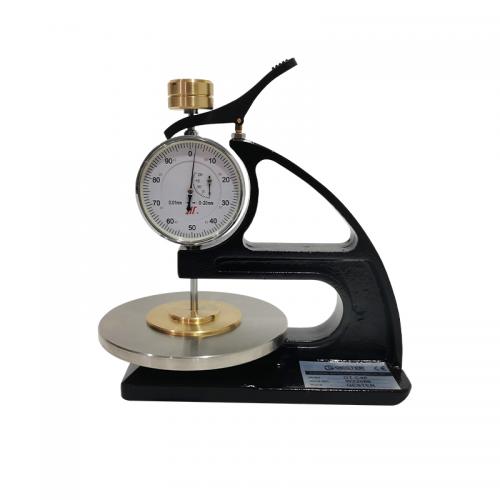Calibration specification for Textiles and Non-woven textiles Digital Thickness Gauge
The Textiles and Non-woven textiles Digital Thickness Gauge is an advanced non-destructive testing device that relies on piezoresistive or capacitive sensor technology. It applies a certain pressure to the fabric through a precision probe, sensing the deformation resulting from this pressure. The magnitude of the deformation is directly related to the thickness of the fabric. Through corresponding circuitry and software processing, the deformation signal is converted into a readable digital signal, ultimately displaying the fabric's thickness value on the screen. This measurement method is both rapid and accurate, without causing any damage to the fabric.
Applicable Standards
ISO 9073-2, FZ/T 60004, GB/T 24218.2
Measuring Range: 0 - 10 mm / 0 - 0.4 inch (0 - 25mm / 1 inch optional)
Applications
Digital thickness testers have a wide range of applications in the field of textiles and nonwovens, including but not limited to:
- Quality Control: In the production process of textiles, digital thickness testers can be used for real-time monitoring of fabric thickness, ensuring consistency and stability in product quality.
- Research and Development: They provide data references for the research and development of textiles, helping designers better understand material properties and thus design products that better meet market demands.
Material Selection: In the process of selecting materials for textiles and nonwovens, digital thickness testers can be used to compare the thickness of different materials, thereby selecting the most suitable material.

Calibration Specifications
Calibration of digital thickness testers is a crucial process that ensures the accuracy and reliability of the instrument. Calibration specifications typically include the following steps:
- Selecting Appropriate Standard Samples: Standard samples should have similar material, structure, and thickness characteristics to the fabrics being tested to ensure the accuracy and effectiveness of calibration.
- Preheating and Cleaning the Instrument: Power on the fabric thickness tester and preheat it to a stable state, while ensuring that the measurement points, sensors, and calibration templates are clean, removing impurities that may affect calibration results.
- Zero Calibration: Place the probe or measurement device in a state without fabric, and press the zero calibration button to make the instrument display "0" or the corresponding initial value. Repeat this operation several times until the instrument displays a stable and accurate reading.
- Measuring Standard Samples: Place the probe steadily on the standard sample, ensuring close contact. Press the measurement button, read the measurement value, and compare it with the actual thickness value of the standard sample to calculate the deviation.
- Adjusting Calibration Parameters: Adjust the calibration parameters of the instrument based on the deviation value until the measurement value matches the actual thickness value or falls within the allowed error range.
- Repeatability Testing: Continuously measure several times at the same location or on the same standard sample to observe the repeatability of the measurement results. If repeatability is poor, check factors such as the probe's condition and measurement environment, and perform necessary adjustments or maintenance.
- Verifying Calibration Results: After completing calibration, use other standard samples with known thicknesses to perform verification measurements to ensure the accuracy of the calibration results.
Furthermore, fabric thickness testers should be calibrated regularly to maintain their long-term stability and accuracy. Additionally, keeping the instrument clean and dry, and avoiding violent vibrations and shocks, are also important measures to ensure its accuracy.
Gellowen Science is the supplier of the old brand standard equipment, offering a comprehensive range of products across multiple industries. With a world-renowned reputation, Gellowen Science has established strategic partnerships with numerous multinational corporations. Our company is also actively involved in developing testing equipment for various fields, particularly focusing on providing customized solutions for our customers. We boast a talented team in research, development, design, and production of software and hardware, ensuring our testing equipment offers high quality, stable testing procedures, and advanced intelligence. Our testing equipment caters to production, education, research, quality inspection, and more, adhering to standards from different regions and countries, including EN, ISO, and BS.

